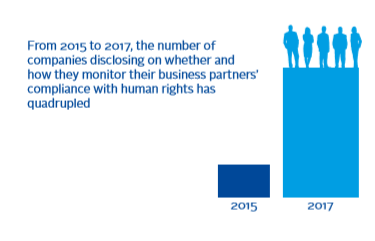High-level trends
Business relationships - selection
- Over half of the companies now report on the criteria used to select business relationships e.g. suppliers and security providers. While all categories have made progress on this indicator, companies in emerging markets have shown most improvement with almost half of them now disclosing on this.
Business relationships - stipulating expectations/terminating contracts
- In 2015, half of the companies were disclosing on whether and how they included human rights criteria in contracts with business partners. Notable progress has been made as more than two thirds of them now do. Progress in disclosure was observed across all categories although emerging countries stood out: the companies from this sub-group disclosing on this indicator has tripled.
Good practice: business relationships, selection
Total favours the selection of business partners on the basis of their ability to comply with its business principles. Depending on the purchasing categories involved, Total asks suppliers tailored questions about their practices in human rights in the workplace. Furthermore in the case of security providers, the company has issued a guide and a corporate security policy to provide managers with specific guidelines on the selection of private security companies. The group’s business units are required to conduct due diligence when recruiting private security personnel. They are meant to check via a preliminary survey of potential security providers that no one involved in human rights abuses has been recruited, for instance.

Business relationships - awareness raising
- The number of companies disclosing on whether and how they raise awareness among their business partners around human rights risks has tripled from 2015 to 2017. Progress in disclosure was observed year on year for all sub-categories of companies.
Business relationships - monitoring
- From 2015 to 2017, the number of companies disclosing on whether and how they monitor their business partners’ compliance with human rights has quadrupled. This encouraging trend has been driven by considerable improvement across all categories: most notably, while no companies in the oil and gas and emerging subcategories were disclosing on this indicator in 2015, half of both groups now do.
Good practice: business relationships, stipulating expectations/terminating contracts
For all new contracts with suppliers, Antofagasta includes specific clauses requiring them to comply with the group’s compliance model. It comprises of the code of ethics that contain specific expectations in terms of human rights; the crime prevention model; whistleblowing; communication and training programme and compliance risks and control assessment. As part of the compliance model, due diligence is performed on all new suppliers before they are engaged and periodically thereafter. The due diligence process requires suppliers to complete a questionnaire explaining their compliance models, training programmes, codes of conduct, processes for receiving and investigating complaints, third party background checks and compliance procedures for the prevention of slavery and human trafficking. As part of the risk assessment process, all of the group’s suppliers are reviewed based on the outcome of the due diligence analysis, the supplier’s location and the slavery index of the country in which they operate.

What should investors look out for?
Business relationships - selection
- Failure to include human rights criteria in the selection of business partners.
- Failure to conduct due diligence of potential business partners and check involvement in human rights violations.
Business relationships - stipulating expectations/terminating contracts
- Human rights clauses not included in contract with business partners – even in high-risk locations.
- Lack of consideration of how company requirements (e.g. order volume and timing, pricing, etc.) may affect the rights of workers and communities for business partners.
- Violation of human rights clauses is not included as cause for terminating contract with business partners.
- Human rights clauses only included in contract with suppliers but not with other partners e.g. security personnel provider.
Good practice: business relationships, awareness raising
Glencore operations engage with staff and business partners to raise awareness of human rights and ensure alignment with its standards. This can take the form of direct human rights training to employees and contractors, or partnership with appropriate international organisations where direct training may not be possible, as in the case with the DRC, where they partner with UN local entity MONUSCO to raise awareness of human rights issues amongst police officers operating at their concessions. In regions with a high risk of human rights abuses, they require their security contractors to comply with the Voluntary Principles. Where public security forces, such as local military or police forces, operate at their assets, they engage with host governments to raise awareness of international human rights standards and promote responsible practices.
Business relationships - awareness raising
- Failure to communicate expectations re human rights to business partners.
- Communication around human rights risks is not made through the appropriate channels (language barrier, etc.).
- Awareness raising around human rights risks does not entail capacity building and training – outcomes of outreach are not monitored.
Business relationships - monitoring
- Failure to implement processes to insure that human rights violations by business partners can be reported.
- Failure to regularly review business partners re human rights – only conduct ad-hoc monitoring.
- Lack of onsite visits to assess business partners re human rights.
- Failure to engage with workers and community members when monitoring business partners re human rights.
Good practice: business relationships, monitoring
Glencore operations engage with staff and business partners to raise awareness of human rights and ensure alignment with its standards. This can take the form of direct human rights training to employees and contractors, or partnership with appropriate international organisations where direct training may not be possible, as in the case with the DRC, where they partner with UN local entity MONUSCO to raise awareness of human rights issues amongst police officers operating at their concessions. In regions with a high risk of human rights abuses, they require their security contractors to comply with the Voluntary Principles. Where public security forces, such as local military or police forces, operate at their assets, they engage with host governments to raise awareness of international human rights standards and promote responsible practices.
Download the full report
-

Digging deeper: human rights and the extractives sector
July 2018
Human rights and the extractives industry
- 1
- 2
- 3
- 4
- 5
- 6
- 7
- 8
- 9Currently reading
Engagement against objectives: business relationships













